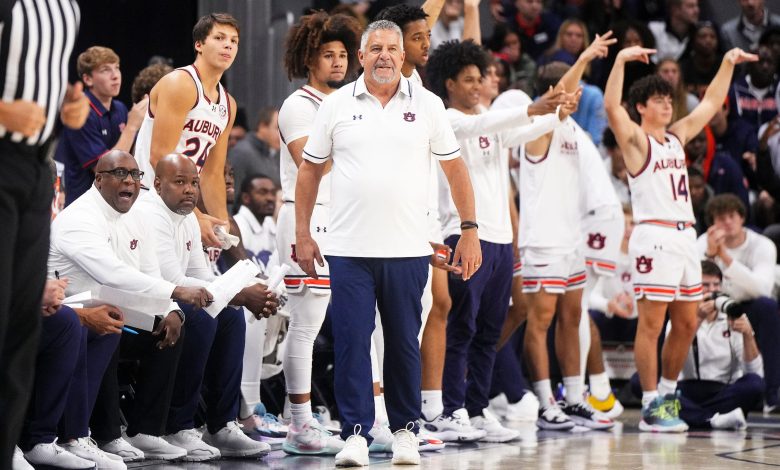Auburn Tigers Thrive in Close Games Under Bruce Pearl’s Leadership

Under the guidance of head coach Bruce Pearl, the Auburn Tigers have become a perennial powerhouse in college basketball. But what truly sets Auburn apart in the fiercely competitive Southeastern Conference (SEC) and across the nation is their remarkable ability to thrive in close games. Whether it’s a buzzer-beater, a late defensive stop, or a clutch performance in the final minutes, the Tigers consistently show resilience and poise when the game is on the line.
Since Pearl took over as Auburn’s head coach in 2014, the program has undergone a transformation, evolving from a middle-of-the-pack SEC team to a legitimate national title contender. One of the key aspects of Pearl’s tenure has been the ability to get his players to perform under pressure. It’s this ability to execute in high-stress situations, particularly in close games, that has earned Auburn a reputation for toughness and mental fortitude. This article takes a closer look at how the Auburn Tigers have thrived in close games under Bruce Pearl’s leadership and why this attribute has become a hallmark of the program.
The Bruce Pearl Effect: A Coach Who Knows How to Win Tight Games
Bruce Pearl is widely regarded as one of the best coaches in college basketball, and his success with Auburn has been no accident. What sets him apart is his ability to motivate and prepare his players for every possible scenario, particularly in the final minutes of a game. Pearl’s reputation as an energetic, high-spirited coach is matched by his tactical acumen in close-game situations.
The Tigers’ ability to win close games is not just the result of one or two lucky bounces. Instead, it’s a byproduct of several factors—well-prepared players, mental toughness, defensive schemes, and a systematic approach to late-game execution. Under Pearl’s leadership, Auburn has consistently shown that they are a team capable of handling the pressure that comes with tight contests. Whether it’s executing after a timeout, managing the clock, or making key free throws in the final seconds, Auburn has been able to execute when it matters most.
Late-Game Execution: A Masterclass in Poise and Strategy
One of the hallmarks of Pearl’s coaching philosophy is late-game execution. He understands that in tight games, every possession counts, and his teams have been particularly adept at making the most of those crucial moments. Pearl’s strategy is often focused on simplifying the game in the final minutes, putting his players in positions where they can be successful.
Auburn’s offensive system is built around spacing, ball movement, and creating opportunities for players to read the defense. In late-game situations, Pearl has been known to draw up plays that maximize the Tigers’ strengths, such as using their athleticism and versatility to get to the basket or to free up shooters for open three-point attempts. The ability to execute this type of offense with precision in clutch situations is one of the reasons Auburn has been able to thrive in close games.
One of the most notable examples of Auburn’s late-game execution came in the 2019 NCAA Tournament, during the Tigers’ run to the Final Four. In the Elite Eight against Kentucky, the game came down to the final moments, and Pearl’s squad remained composed despite the high stakes. With just a few seconds remaining in a tie game, Auburn executed a perfect inbounds play that led to a clutch three-pointer by Jared Harper, sending Auburn to the Final Four. This victory was a testament to Pearl’s ability to put his team in position to succeed when the game was on the line.
In addition to offensive execution, Pearl places significant emphasis on defensive schemes in tight games. Whether it’s a full-court press, man-to-man defense, or a trapping defense in the half court, the Tigers have been known to apply pressure and create turnovers in the final minutes of close contests. The ability to get stops when the game is tight is equally as important as scoring, and Pearl has instilled a defensive mindset that thrives in these high-pressure moments.
Mental Toughness: A Key Factor in Auburn’s Close-Game Success
In close games, where the stakes are high and the margin for error is razor-thin, mental toughness becomes the ultimate differentiator. Auburn’s players have consistently shown the ability to stay composed under pressure, and much of this is attributed to Pearl’s ability to cultivate a resilient mindset within his team.
Under Pearl, Auburn has been able to build a culture where players expect to win close games. The confidence instilled by their coach makes them believe that they can find a way to win, no matter how difficult the circumstances. This belief is crucial, especially when the game is on the line and the pressure is mounting. For Pearl, it’s not just about drawing up the right play—it’s about having players who are mentally prepared to execute it when it counts.
Mental toughness also shows in Auburn’s ability to overcome adversity during the course of a game. Whether it’s battling back from a late deficit, recovering from a missed shot, or staying focused after a bad call, Auburn has demonstrated a resilience that’s been a key part of their success. Players like Jabari Smith, Walker Kessler, and Allen Flanigan have all embodied this toughness, whether it’s fighting through injuries or hitting key shots in crunch time.
An excellent example of Auburn’s mental fortitude came during the 2021-2022 season when they faced multiple close contests, especially in SEC play. In a matchup against Alabama, Auburn was down by 10 points with just over three minutes remaining. Despite the mounting pressure, the Tigers executed a stunning comeback by forcing turnovers and making clutch shots. They eventually secured the win in a dramatic fashion, demonstrating the mental resilience Pearl has instilled in his players.
The Role of Leadership: Veterans Stepping Up in the Clutch
Another critical aspect of Auburn’s success in close games is the leadership provided by veteran players who have experienced high-pressure moments. Players like Jabari Smith, Sharife Cooper, and K.D. Johnson have been instrumental in steering the team through tense stretches.
In particular, Auburn’s guard play has been a major factor in their ability to close out games. Guards like Wendell Green Jr. and Zep Jasper have shown the ability to control the tempo in the final minutes, making intelligent decisions and creating scoring opportunities when needed most. Whether it’s hitting a big three-pointer or driving to the hoop in the clutch, Auburn’s guards have often proven to be the difference-makers in close games.
Furthermore, Auburn’s leadership on the court goes beyond just scoring. The ability to communicate and keep the team composed under pressure is equally important, and players like Jaylin Williams and Chris Moore have served as vocal leaders, ensuring that everyone remains focused in crunch-time situations.
Pearl’s veteran players are often the ones to step up when the game is on the line, using their experience and poise to guide the younger players through tough moments. This blend of youthful energy and veteran composure has allowed Auburn to remain competitive in tight contests, knowing that they have the right mix of players to execute when it matters.
Auburn’s Consistent Close-Game Success: Statistical Evidence
The numbers back up the narrative that Auburn is particularly effective in close games. Over the course of Bruce Pearl’s tenure, Auburn has routinely been involved in games decided by 10 points or fewer, and they’ve managed to win their fair share of those contests. In fact, Auburn’s record in games decided by five points or fewer is a testament to their ability to thrive under pressure.
For example, in the 2020-2021 season, Auburn won several nail-biting games against SEC rivals like Alabama and Arkansas. In those contests, Auburn showcased their ability to execute in high-pressure situations, whether it was hitting clutch free throws, making critical defensive stops, or securing key rebounds. The Tigers’ ability to handle the pressure of tight games has been a hallmark of their success in the Pearl era.
In addition, Auburn has consistently ranked among the top teams in the SEC in terms of late-game scoring efficiency. The Tigers’ ability to execute their offensive sets in the final minutes, combined with their ability to force turnovers and get stops, has made them a formidable opponent in close games.
Why Close-Game Success Is So Important for Auburn
Winning close games is more than just a sign of a mentally tough team—it’s a critical indicator of a program’s overall success. In a conference as competitive as the SEC, where every team is fighting for a chance to compete in the NCAA Tournament, being able to win tight games is essential for securing high seeds and advancing through the postseason.
For Auburn, close-game success has not only helped them maintain national relevance but also provided them with confidence heading into crucial matchups in March Madness. The ability to win tight games on the biggest stage makes Auburn a dangerous team in the NCAA Tournament, where games are often decided in the final minutes. This ability to perform in the clutch will be invaluable as the Tigers look to continue their success both in conference play and in the tournament.
Bruce Pearl’s Auburn Tigers—A Team That Thrives Under Pressure
Under Bruce Pearl’s leadership, Auburn has established itself as a team that thrives in the most pressure-filled moments. Whether it’s a crucial late-game possession or a buzzer-beater that sends the crowd into a frenzy, the Tigers have proven that they can execute and perform when the game is on the line.
The combination of Pearl’s coaching expertise, the team’s mental toughness, and the leadership of veteran players has made Auburn one of the most dangerous teams in college basketball. As the Tigers continue to grow and evolve, they will undoubtedly remain a force to be reckoned with, especially in close games where their ability to rise to the occasion sets them apart.
Auburn’s continued success in high-stakes situations is a testament to Bruce Pearl’s culture of excellence and the players who embody it. With this mindset, the Tigers will continue to compete at the highest levels of college basketball, and their ability to win close games will be key to their future success.









